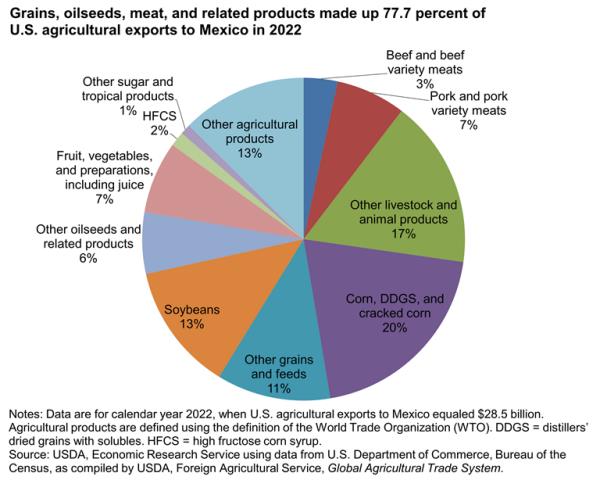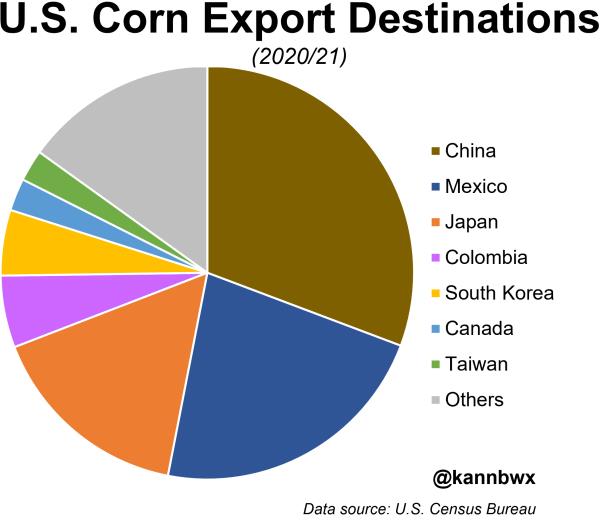On December 31st 2020, the Government of Mexico announced that it would ban importation of GM corn and end the use of glyphosate as an herbicide, with a target date of January 31st 2024. Given that the U.S. exports approximately 17 million metric tons (669 million bushels) of yellow corn to Mexico annually valued in 2022 at $4.8 billion, the implications for U.S. corn growers were immediately self-evident. The U.S. invoked USMCA rules and engaged in negotiations with the Government of Mexico dealing with the Departments of the Environment, of Health and Agriculture

As a result, Mexico conceded and dropped the ban on the application of glyphosate and GM cultivars of corn imported for animal feed. Mexico firmly retained a requirement that only non-GM white corn could be imported since this product is the basis of tortillas and for white corn flour both food staples. In mid-2023 Mexico imposed a 50 percent tariff on the importation of white corn to stimulate domestic production.
Failure of the government of Mexico to rescind the 2020 decree left no other option than for the U.S. Trade Representative to initiate a dispute panel on August 17th 2023 under Article 31of the USMCA Charter.
Mexico justifies opposition to GM corn on the potential impact on the biodiversity of native corn cultivars and the potential carcinogenicity of glyphosate. For any of the three USMCA nations to ban a product it is necessary to demonstrate that action is based on relevant international standards and guidelines supported by a valid risk assessment.
The carcinogenicity of glyphosate is subject to question. The issue arose in March 2015 with the publication of a report by the International Agency for Research on Cancer (IARC) that considered glyphosate as “probably carcinogenic for humans”. It is noted that the principal author of the report was at the time and then subsequently serving as a technical expert supporting tort claims against the manufacturers of glyphosate. He provided an opinion that that the compound could be responsible for lymphoma basing the conclusion on his own meta-study. His involvement of the IARC report representing the cornerstone of litigation was clearly a conflict of interest and draws into question the validity of the findings based on a subjective review of published literature. The U.S. Environmental Protection Agency has concluded that glyphosate is not carcinogenic, notwithstanding the contentious label warning required by the state of California.
 It is evident that Mexico will rely on a provision of the USMCA that restrictions can be imposed to “protect human, animal or plant health” as the justification for the 2020 decree. Mexico will however be obliged to defend their position since USMCA stipulates that restrictions should “not constitute a means of arbitrary or unjustifiable discrimination between countries where the same conditions prevail.”
It is evident that Mexico will rely on a provision of the USMCA that restrictions can be imposed to “protect human, animal or plant health” as the justification for the 2020 decree. Mexico will however be obliged to defend their position since USMCA stipulates that restrictions should “not constitute a means of arbitrary or unjustifiable discrimination between countries where the same conditions prevail.”
The second concern expressed by Mexico is that importation of GM corn may in some way be deleterious to the numerous strains of native corn. This is a highly speculative and scientifically unjustifiable position. Predictably, negative propaganda was circulated, creating extensive antagonism to imported GM corn among farmers that represent an important voting bloc supporting the left-of-center government. Small-scale farmers who are inherently inefficient with respect to yields are obviously concerned over competition from imported U.S. corn whether for livestock, industrial or human consumption. The populist government of President Andres Moreno Lopez Obrador (‘AMLO’) is evidently responding to this groundswell.
|


|
The review by the USMCA dispute panel will be a drawn-out process. The panel when formed must provide an initial report within five months and then allowing a subsequent two months to receive and consider comments before issuing a final decision. Even if the panel rules in favor of the U.S., Mexico is not obliged to respond before 45 days and protracted appeals will ensue. Failure to conform to the dispute panel final ruling will oblige Mexico to compensate the U.S. in some way possibly through imposition of tariffs on Mexican products.
The subject of trade and its regulation within nations including the three members of the USMCA has recently been complicated by tension between the U.S. and China. In a move to displace imports of manufactured good from China, the U.S. has encouraged production in Mexico, with offshoring in Mexico by Chinese-owned companies. The supply chains of the U.S., Canada and Mexico are closely intertwined, especially within the auto industry. There is considerable pressure to maintain the current level of trade within the USMCA since the alternatives to harmony would be economically devastating to Mexico and damaging to the economies of the U.S. and Canada.
In recognition of the consequences of an adverse ruling by the dispute panel based on the flimsy justification of the 2020 decree, Mexico has proposed a joint consultation between the U.S. FDA and the Federal Sanitary Commission of Mexico. This offer was rejected, since the U.S. and many other nations consider that the carcinogenicity of glyphosate is unproven.
If Mexico imposes additional restrictions on importation of yellow GM corn from the U.S., corn growers will lose a significant market, further complicated by decreasing purchases by China currently the leading importer of the commodity. This in turn would lead to a sharp decline in the ex-farm price of corn, benefiting domestic livestock producers. Alternative supplies of non-GM yellow corn for livestock production would be difficult if not impossible to obtain at prices consistent with exports from the U.S. This in turn would deprive Mexican consumers of supplies of chicken and eggs creating problems for consumers and indirectly for the Government.
The position adopted by Mexico with regard to GM is contrary to the acceptance of approved GM cultivars by China, currently a major importer of GM corn and soybeans from the U.S. According to recent reports China has evaluated and is now moving towards domestic production of GM cultivars to improve yields and move towards self-sufficiency. The E.U. continues to import GM corn and soybeans and individual nations in Europe are considering domestic cultivation.
It is apparent that the 2020 decree by Mexico was based on a Presidential whim influenced by misinformed advisors. The implications for the economy of Mexico and obligations to the UMCA were obviously not considered in the from-left field edict. It would be advantageous for the U.S. and Canada to establish a negotiating strategy that will allow the Government of Mexico and President AMLO to withdraw from their opposition to GM corn imports and save political capital through a phased reversal of their position. AMLO should heed the advice expressed by the character Fagin in the Broadway show Oliver who when confronted with a dilemma sings, “I think I better think it out again”